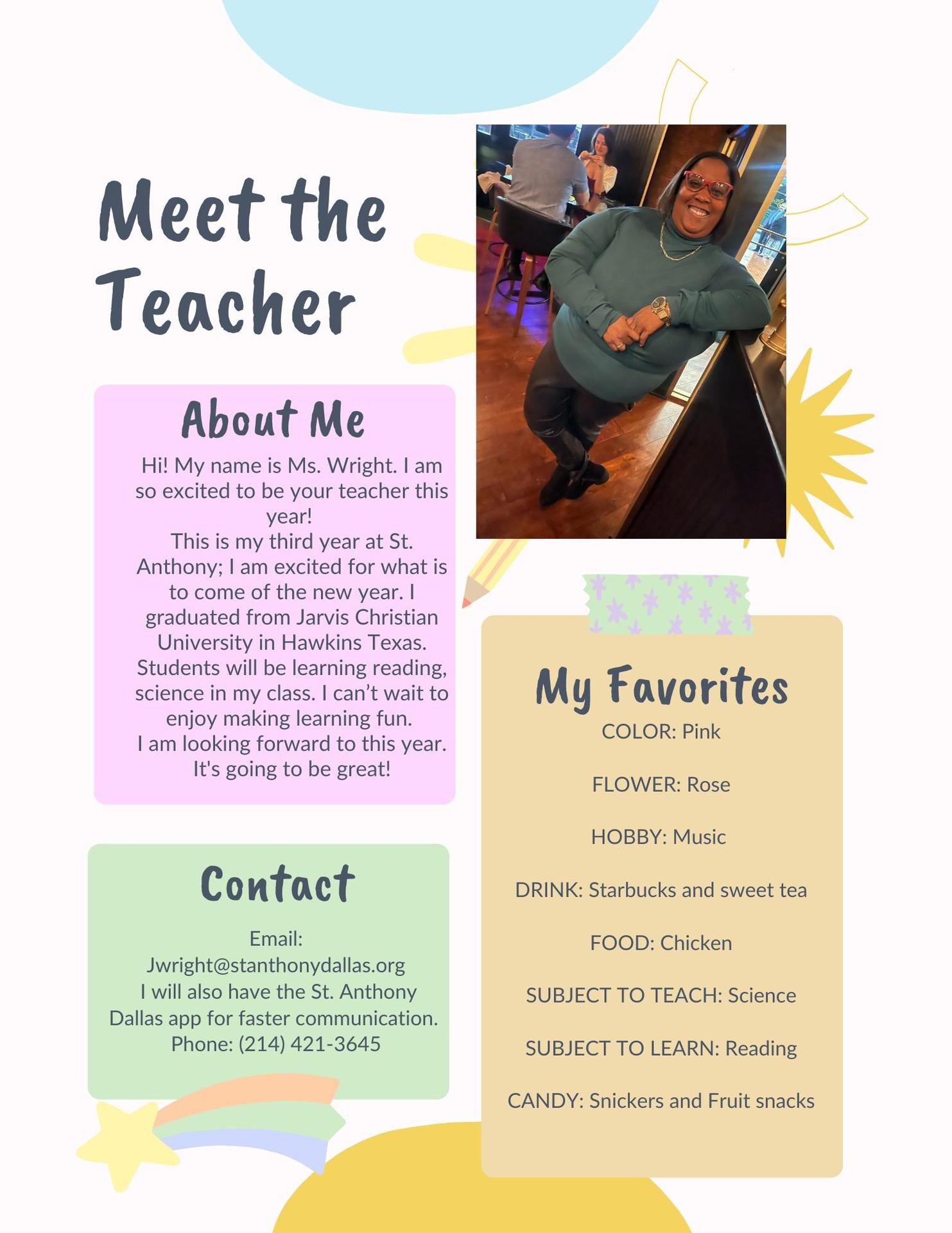Ms. Wright Reading/ Science Class

4th Grade Schedule
4th Grade Savvas Science Syllabus: Year-at-a-Glance
This syllabus outlines the major units and topics covered in a typical Savvas Science curriculum for Grade 4, structured around the three main branches of science.
|
Unit |
Focus Area |
Key Concepts Covered |
Investigative Skills Focus |
Project/Assessment Highlight |
|---|---|---|---|---|
|
Unit 1 |
Physical Science: Matter |
Properties of Matter: Measuring mass, volume, and density. States of Matter (solids, liquids, gases) and how they change (freezing, melting, evaporation). Mixtures and Solutions. |
Using tools to measure (balances, graduated cylinders). Data collection and graphing. |
Design a system to separate a complex mixture. |
|
Unit 2 |
Physical Science: Energy & Forces |
Energy: Forms of energy (light, heat, sound, electrical, mechanical). Transfer of energy. Forces: Gravity, friction, and magnetism. Simple Machines (lever, pulley, wheel and axle). |
Designing and building simple machines. Investigating how force affects motion (push/pull). |
Build and test a vehicle powered by a non-mechanical energy source (ee.g., rubber band, balloon). |
|
Unit 3 |
Earth Science: Weather & Water |
Weather: The water cycle, measuring weather conditions (temperature, wind speed, precipitation). Cloud formation and basic weather prediction. Erosion: The effects of wind, water, and ice on landforms. |
Observing and recording weather data over time. Creating models of the water cycle. |
Create a weather station using household materials and record data for one week. |
|
Unit 4 |
Earth Science: The Solar System |
Space: Components of the Solar System (Sun, planets, moons, asteroids). Earth's rotation (day/night) and revolution (seasons). Moon phases and eclipses. |
Building scale models of the solar system. Observing and charting the Moon's appearance over a month. |
Research and present on one planet, focusing on its relationship to the Sun. |
|
Unit 5 |
Life Science: Organisms & Environments |
Ecosystems: Producers, consumers, and decomposers. Food chains and food webs. Adaptations: How plants and animals adapt to survive in their specific environments (deserts, forests, aquatic). |
Identifying components of a local ecosystem. Observing animal behaviors and plant responses. |
Research an animal's unique structural or behavioral adaptation and design a way to protect that adaptation. |
|
Unit 6 |
Life Science: Structures & Functions |
Plants: Identifying and explaining the function of plant parts (roots, stems, leaves, flowers). Photosynthesis (basic understanding). Animals: Human body systems (skeletal, muscular, digestive—overview). |
Dissection (virtual or physical) of a flower/seed to identify parts. Modeling how plant structures help them grow. |
Create a labeled diagram or model of a flowering plant, explaining the function of each part. |
Key Grade 4 Scientific Investigation & Reasoning Skills:
-
Hypothesizing: Developing testable questions and predicting outcomes.
-
Safety: Applying safety rules during classroom and field investigations.
-
Observation: Making careful and repeated observations and measurements.
-
Communication: Using charts, graphs, and models to communicate results.
4th Grade Bluebonnet Learning Reading Syllabus: Year-at-a-Glance
This syllabus provides an overview of the major reading, comprehension, and writing skills covered across the year, typically aligning with the Texas Essential Knowledge and Skills (TEKS) for Grade 4.
|
Unit |
Focus Theme |
Key Reading Skills (TEKS) |
Key Writing & Language Focus |
Assessment |
|---|---|---|---|---|
|
Unit 1 |
Setting Goals & Narratives |
Fiction & Personal Narrative: Understanding plot, setting, characterization, internal/external conflict, and theme. Analyzing point of view (1st and 3rd person). |
Personal Narrative Writing: Drafting, revising for sensory details, dialogue, and sequence. Grammar: Reviewing sentence structure and types. |
Unit Assessment 1 |
|
Unit 2 |
Invention & Informational Texts |
Informational Texts: Making inferences, synthesizing information from multiple sources, identifying main ideas and supporting evidence. Analyzing text structure (compare/contrast, cause/effect). |
Informational Writing / Persuasive Pitch: Research skills, citing sources, and writing a persuasive essay/pitch using logical reasons and evidence. |
Unit Assessment 2 |
|
Unit 3 |
Poetry & Figurative Language |
Poetry & Literary Nonfiction: Analyzing poetic elements (rhyme, rhythm, stanza), understanding figurative language (similes, metaphors, personification, idioms/adages). Interpreting mood and tone. |
Poetry Writing: Creating various forms of poetry; focusing on precise word choice and imagery. Grammar: Punctuation and capitalization rules. |
Unit Assessment 3 |
|
Unit 4 |
Drama & Text Features |
Drama & Literary Text: Identifying dramatic elements (dialogue, stage directions, cast of characters). Using text features (headings, captions, graphs) to locate and understand information. |
Short Script Writing: Writing dialogue, stage directions, and creating a brief scene. Language: Recognizing and correcting fragments and run-on sentences. |
Unit Assessment 4 |
|
Unit 5 |
Biographies & Research |
Expository Texts (Biography/Autobiography): Distinguishing between fact and opinion, identifying primary and secondary sources, and evaluating the author's purpose in conveying biographical information. |
Research Project: Conducting multi-step research on a historical figure, synthesizing information into a structured report, and organizing paragraphs logically. |
Unit Assessment 5 |
|
Unit 6 |
Argument & Persuasion |
Persuasive Texts: Analyzing argumentative texts; distinguishing claims from evidence, recognizing rhetorical devices, and evaluating the logic of an argument. |
Argumentative Essay: Stating a clear claim, supporting it with evidence, and structuring a multi-paragraph essay. Grammar: Verb tense consistency and subject-verb agreement. |
Unit Assessment 6 |
|
Unit 7 |
Synthesis & Review |
Cross-Genre Skills: Review and application of all major 4th-grade comprehension skills across fiction, informational, and literary genres in preparation for standardized testing. |
Review & Editing: Intensive focus on editing for conventions (spelling, capitalization, punctuation) and revising for clarity and coherence. |
Final Comprehensive Assessment |
Key Grade 4 TEKS Highlights:
-
Inferencing: Students are expected to make complex inferences and support them with text evidence.
-
Vocabulary: Continuous focus on word analysis, including common Greek and Latin roots, prefixes, and suffixes.
-
Fluency: Emphasis on reading with appropriate rate, expression, and phrasing.
-
Genres: Significant exposure to Literary Texts (Fiction, Poetry, Drama) and Informational Texts (Expository, Persuasive, Procedural).
